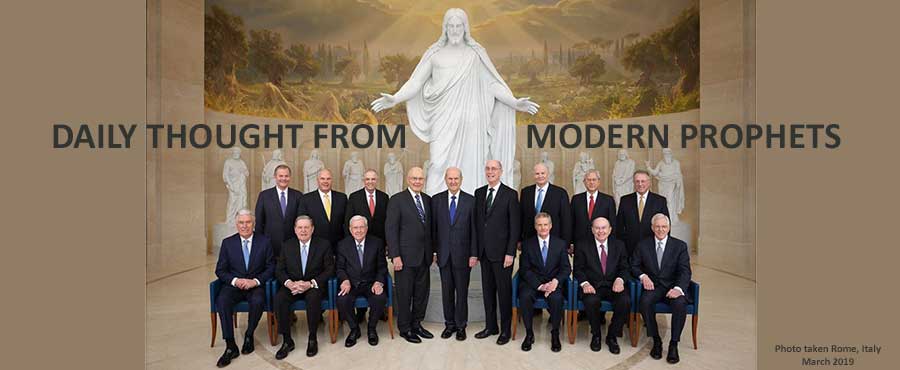"I think we will witness increasing evidence of Satan's power as the kingdom of God grows stronger. I believe Satan's ever-expanding efforts are some proof of the truthfulness of this work. In the future the opposition will be both more subtle and more open. It will be masked in greater sophistication and cunning, but it will also be more blatant. We will need greater spirituality to perceive all of the forms of evil and greater strength to resist it. But the disappointments and setbacks to the work of God will be temporary, for the work will go forward (see D&C 65:2)....
"Who has not heard and felt the enticings of the devil? His voice often sounds so reasonable and his message so easy to justify. It is an enticing, intriguing voice with dulcet tones. It is neither hard nor discordant. No one would listen to Satan's voice if it sounded harsh or mean. If the devil's voice were unpleasant, it would not entice people to listen to it....
"As the great deceiver, Lucifer has marvelous powers of deception. As Paul said to the Corinthians, 'And no marvel; for Satan himself is transformed into an angel of light' (2 Cor. 11:14; see also 2 Ne. 9:9).
"Some of Satan's most appealing lines are 'Everyone does it'; 'If it doesn't hurt anybody else, it's all right'; 'If you feel all right about it, it's OK'; or 'It's the "in" thing to do.' These subtle entreaties make Satan the great imitator, the master deceiver, the arch counterfeiter, and the great forger."
- James E. Faust, "The Great Imitator", Ensign, Nov. 1987, p. 33
Click here to read the full talk
It's been almost 30 years since President Faust shared this counsel, warning of "increasing evidence of Satan's power." He foresaw a time when Satan's work would be "both more subtle and more open." That's interesting to ponder. We certainly see evil and temptation being expressed more openly in ways that didn't exist three decades ago (e.g., pornography on the Internet). But we also see the more subtle aspects being manifest, as morality in society gradually erodes, intellectual priorities are changing, and so on — in "greater sophistication and cunning." This was a key warning: "We will need greater spirituality to perceive all of the forms of evil and greater strength to resist it."
It's wise to listen to prophetic warnings, and carefully consider how they apply to our lives. I appreciate President Faust's counsel as he points out the areas of danger.




































